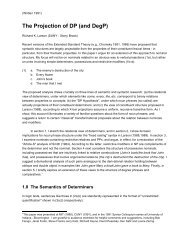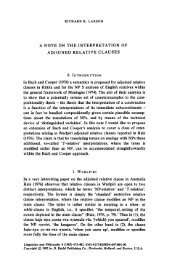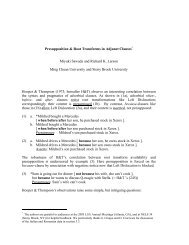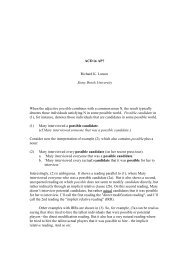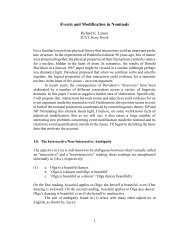Intensional Transitive Verbs and Abstract Clausal Complementation
Intensional Transitive Verbs and Abstract Clausal Complementation
Intensional Transitive Verbs and Abstract Clausal Complementation
You also want an ePaper? Increase the reach of your titles
YUMPU automatically turns print PDFs into web optimized ePapers that Google loves.
<strong>Intensional</strong> <strong>Transitive</strong> <strong>Verbs</strong> <strong>and</strong> <strong>Abstract</strong> <strong>Clausal</strong> <strong>Complementation</strong><br />
(36b) He T be preferred-FOR [ AgrsP t to be patient]]<br />
\ NOM√ / LIGHT \ NOM / √<br />
Thus passive is available from the subject of ECM complements, but not from the subject of for-to.<br />
With this background account of non-finite complementation, we now address intensional<br />
transitives. We will consider concealed infinitival complements <strong>and</strong> concealed ECM complements<br />
separately. Furthermore, within the former, we will distinguish between complements that we analyze as<br />
containing an implicit verb HAVE, <strong>and</strong> those analyzed as containing an implicit verb FIND.<br />
3.0 Concealed Infinitival Complements with HAVE<br />
3.1 Restructuring<br />
As indicated above, intensional transitive examples like (37a) <strong>and</strong> (38a) appear to be largely synonymous<br />
with examples that show a nonfinite complement containing the verb have, as in (37b,c) <strong>and</strong> (38b,c):<br />
(37) a. Polly hopes/yearns/pines for a cracker.<br />
b. Polly hopes/yearns/pines to have a cracker.<br />
c. Polly hopes/yearns/pines for herself to have a cracker.<br />
(38) a. Polly wants/prefers/desires a cracker.<br />
b. Polly wants/prefers/desires to have a cracker.<br />
c. Polly wants/prefers/desires (for) herself to have a cracker.<br />
The verbs in these examples can all be identified broadly as volitive or volitional. All have to do with the<br />
wishes or desires of an agent.<br />
Interestingly, in the Romance languages a number of verbs that are semantically volitional are<br />
know to undergo a process that permits complement elements to behave as if they were members of the<br />
matrix clause with respect to various syntactic operations. This process is known as restructuring, <strong>and</strong> is<br />
illustrated by the Italian data in (39) <strong>and</strong> (40), from Burzio (1986). (39a) shows that in general, non-finite<br />
complements do not allow objects clitic pronouns from the complement clause to be moved into the matrix<br />
clause. With volitional verbs like volere ’want’, however, such clitic promotion is possible (39b). Similarly,<br />
(40a) shows that the passive-like impersonal construction in Italian doesn’t in general allow promotion of a<br />
complement object to matrix subject position. However, (40b) illustrates that, once again, with verbs like<br />
want such movement is indeed possible:<br />
(39) a. *Mario lo odia [PRO leggere t ].<br />
Mario it hates to read<br />
’Mario hates to read it’<br />
b. Mario lo vuole [PRO leggere t ].<br />
Mario it wants to read<br />
’Mario wants to read it’<br />
15



